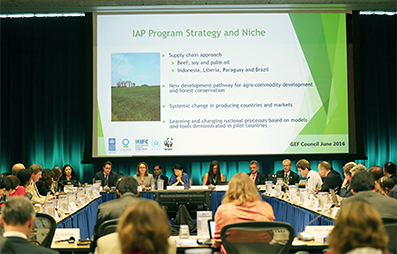 9 June 2016: The 50th meeting of the Global Environment Facility (GEF) Council, which marked the occasion of the 25th anniversary of the GEF, approved a Work Program comprising 38 project concepts and four programmatic frameworks, with total resources amounting to US$398.68 million. In addition, the GEF Council established a new trust fund for the Capacity-building Initiative for Transparency (CBIT), which was created in response to a request by the UNFCCC Conference of the Parties, as reflected in the decision adopting the Paris Agreement on climate change.
9 June 2016: The 50th meeting of the Global Environment Facility (GEF) Council, which marked the occasion of the 25th anniversary of the GEF, approved a Work Program comprising 38 project concepts and four programmatic frameworks, with total resources amounting to US$398.68 million. In addition, the GEF Council established a new trust fund for the Capacity-building Initiative for Transparency (CBIT), which was created in response to a request by the UNFCCC Conference of the Parties, as reflected in the decision adopting the Paris Agreement on climate change.
GEF Chief Executive Officer (CEO) and Chairperson Naoko Ishii and Caroline Leclerc (Canada) served as Co-Chairs for the meetings. Among other agenda items, the Council engaged in a dialogue with the Scientific and Technical Advisory Panel (STAP) Chair and considered GEF 2020 and future directions for the GEF. It also considered the first GEF corporate scorecard and results-based management action plan, monitoring agency compliance with GEF policies, future directions for accreditation, and the GEF project and program cycle policy.
The Council discussed relations with the conventions and other international institutions, with presentations by the Executive Secretaries from the UN Framework Convention on Climate Change (UNFCCC), the UN Convention to Combat Desertification (UNCCD) and the Convention on Biological Diversity (CBD), as well as the Principal Coordinator of the Minamata Convention on Mercury. GEF Council members were also briefed by representatives from the UN Development Programme (UNDP), International Fund for Agricultural Development (IFAD) and the World Bank on progress to date for the three Integrated Approach Pilot (IAP) Programs that their organizations are leading: taking deforestation out of the global commodity supply chain, fostering sustainability and resilience for food security in sub-Saharan Africa, and sustainable cities, respectively.
The approved Work Program consists of four programmatic approaches: “Global Partnership on Wildlife Conservation and Crime Prevention for Sustainable Development”; “TRI The Restoration Initiative – Fostering Innovation and Integration in Support of the Bonn Challenge”; “Leapfrogging Markets to High Efficiency Products”; and “S3MR Sustainable Management of Madagascar’s Marine Resources.”
The work program approved 21 MFA projects, among others: “Incorporating Multiple Environmental Considerations and their Economic Implications into the Management of Landscapes, Forests and Production Sectors in Cuba”; in the Dominican Republic “Mainstreaming Conservation of Biodiversity and Ecosystem Services in Productive Landscapes in Threatened Forested Mountainous Areas”; “Green-Ag: Transforming Indian Agriculture for Global Environmental Benefits and the Conservation of Critical Biodiversity and Forest Landscapes”; and in the Seychelles, “Third South West Indian Ocean Fisheries Governance and Shared Growth Project.”
It approved four projects on biodiversity, among others: “The Path to 2020 – Antigua and Barbuda”; and in Mexico “Securing the Future of Global Agriculture Facing the Threat of Climate Change, Conserving the Genetic Diversity of the Traditional Agroecosystems.” The Council also approved an additional US$40 million for the Global Wildlife Program (GWP), expanding its support to the partnership focused on fighting illegal wildlife trafficking and poaching in 19 countries in Africa and Asia.
The Work Program approved ten projects on climate change, among others: a global project “Technology Needs Assessments-Phase III”; “Promotion of Small Hydropower Based Mini-Grids for a Better Access to Modern Energy Services in Central African Republic”; and “Sustainable Use of Biomass to Assist the Development of Turkey’s Economy Towards a Low-carbon Development Path.”
It approved one regional project on land degradation: “Sustainable Rangeland Management for Biodiversity Conservation and Climate Change Mitigation.”
It approved two projects on chemicals and waste: “PCB-Free Electricity Distribution in Georgia” and in Paraguay, “Strengthening the Environmentally-sound Management and Disposal of PCBs in the Electricity.”
During the discussion on the establishment of CBIT, the US reiterated its multi-year pledge of US$15 million. The UK and Canada reaffirmed their respective pledges of £10 million and CAD$5 million. Others, including Italy, Germany and Japan, expressed their intention to pledge. The Council approved the arrangements proposed for the establishment of a new trust fund, with the aim to support the CBIT as part of the Paris Agreement and the decision adopting it. It further invited the World Bank to act as Trustee for the new CBIT Trust Fund, and the Council approved the programming and implementation modalities for the CBIT, to be supported by the new Trust Fund.
The 50th meeting of the GEF Council convened in Washington, DC, US, from 7-9 June 2016, at World Bank headquarters. The 20th meeting of the Council for the Least Developed Countries Fund and Special Climate Change Fund (LDCF/SCCF) convened on 9 June, and considered a progress report on the funds as well as the 2015 Annual Monitoring Review and 2015 Annual Evaluation Report of the Funds, and Work Program and budgets for 2017.
The meetings were preceded by a consultation with civil society organizations (CSOs) on 6 June, as well as a meeting of the STAP. In addition, Rémi Allah-Kouadio, Minister of Environment and Sustainable Development of Côte d’Ivoire, addressed the opening session, and Li Yong, Director-General, UN Industrial Development Organization (UNIDO), spoke with GEF Council members during a lunchtime dialogue. [IISD RS coverage of the GEF Council meeting] [GEF Council meeting documents] [GEF Press Release on Council Meeting] [GEF Press Release on Wildlife]